Y6 Settings across Genres (project)
£3.00
KS2 National Curriculum:
✓ Exploring settings from a writer’s perspective
✓ Reporting on how setting conventions vary across texts
✓ Identifying what makes each genre distinct
✓ Structuring findings into a written report
This project looks at the settings in a variety of different genres including science fiction, pirate stories, traditional stories and fantasy stories. It also looks at real vs imaginary settings.
There is a five-minute evidence-based CPD activity at the end of this lesson which will develop classroom teachers’ skill set. This CPD consists of a research extract on self-regulation with a five-minute activity based on this extract.
Description
These evidence-based learning (EBL) lessons are based on classroom practice that has been proven, by research, to maximise thinking, learning and attainment. From an extensive review of educational research, we identified the eight key classroom thinking and learning skills that were common across these research papers. We named these eight key skills “EBL skills”.
EBL skills have been proven by research to maximise learning because they combine the most productive thinking skills with the most effective learning behaviours. Each of our evidence-based learning lessons uses the English curriculum as a framework through which the eight EBL skills are delivered.
Teachers also have the opportunity to add to their own skill set or refresh their existing skills with our five-minute CPD activity, based on one of the EBL skills used in this lesson.
The skills in bold below are the EBL skills developed in this Familiar Settings lesson. Click on each skill to learn more about that skill.
- Collaboration
- Thinking Skills
- Peer Assessment
- Peer Teaching
- Self-Assessment
- Metacognition
- Self-Regulation
- Independent Learning
1 review for Y6 Settings across Genres (project)
Only logged in customers who have purchased this product may leave a review.
Related products
-


Y6 Merry Christmas
£3.00 Add to basket £3.00Add to basket
£3.00Add to basketKS2 National Curriculum:
✓ Reading and understanding a suspenseful story opening
✓ Writing a suitable continuation in style and tone
✓ Applying verb types and sentence variation
✓ Reflecting on choices through self-assessmentThis lesson involves looking at a short Christmas extract in detail to examine the use of words and the use of story writing conventions. Activities include answering higher and lower order questions and a creative writing activity that finishes the extract.
There is a five-minute evidence-based CPD activity at the end of this lesson which will develop classroom teachers’ skill set. This CPD consists of a research extract on self-regulation with a five-minute activity based on this extract.
VIEW -

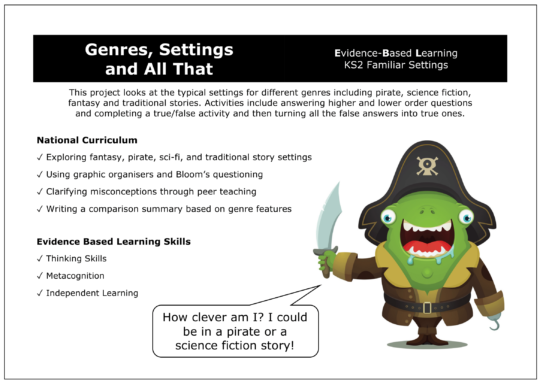
Y5 / Y6 Genres, Settings and All That (project)
£3.00 Add to basket £3.00Add to basket
£3.00Add to basketKS2 National Curriculum:
✓ Exploring fantasy, pirate, sci-fi, and traditional story settings
✓ Using graphic organisers and Bloom’s questioning
✓ Clarifying misconceptions through peer teaching
✓ Writing a comparison summary based on genre featuresThis project looks at the typical settings for different genres including pirate, science fiction, fantasy and traditional stories. Activities include answering higher and lower order questions and completing a true/false activity and then turning all the false answers into true ones.
There is a five-minute evidence-based CPD activity at the end of this lesson which will develop classroom teachers’ skill set. This CPD consists of a research extract on independent learning with a five-minute activity based on this extract.
VIEW -


Y5 Super Settings
£3.00 Add to basket £3.00Add to basket
£3.00Add to basketKS2 National Curriculum:
✓ Comparing fantasy, sci-fi, pirate, and traditional settings
✓ Spotting patterns in descriptive language and story type
✓ Explaining how settings influence tone and events
✓ Writing comparative statements and reflectionsThis lesson explores why different types of stories have different settings and it compares real and imaginary settings. Activities include answering higher and lower order questions.
There is a five-minute evidence-based CPD activity at the end of this lesson which will develop classroom teachers’ skill set. This CPD consists of a research extract on peer teaching with a five-minute activity based on this extract.
VIEW -


Y5 All Characters Welcome
£3.00 Add to basket £3.00Add to basket
£3.00Add to basketKS2 National Curriculum:
✓ Describing characters; developing dialogue and consistency in character.
Activities in this lesson include learning about the need to be consistent when describing a character; looking at the four conventional ways of describing a character, identifying the characteristics of good and bad characters in science fiction stories and answering higher and lower order questions.
There is a five-minute evidence-based CPD activity at the end of this lesson which will develop classroom teachers’ skill set. This CPD consists of a research extract on self-regulation with a five-minute activity based on this extract.
VIEW

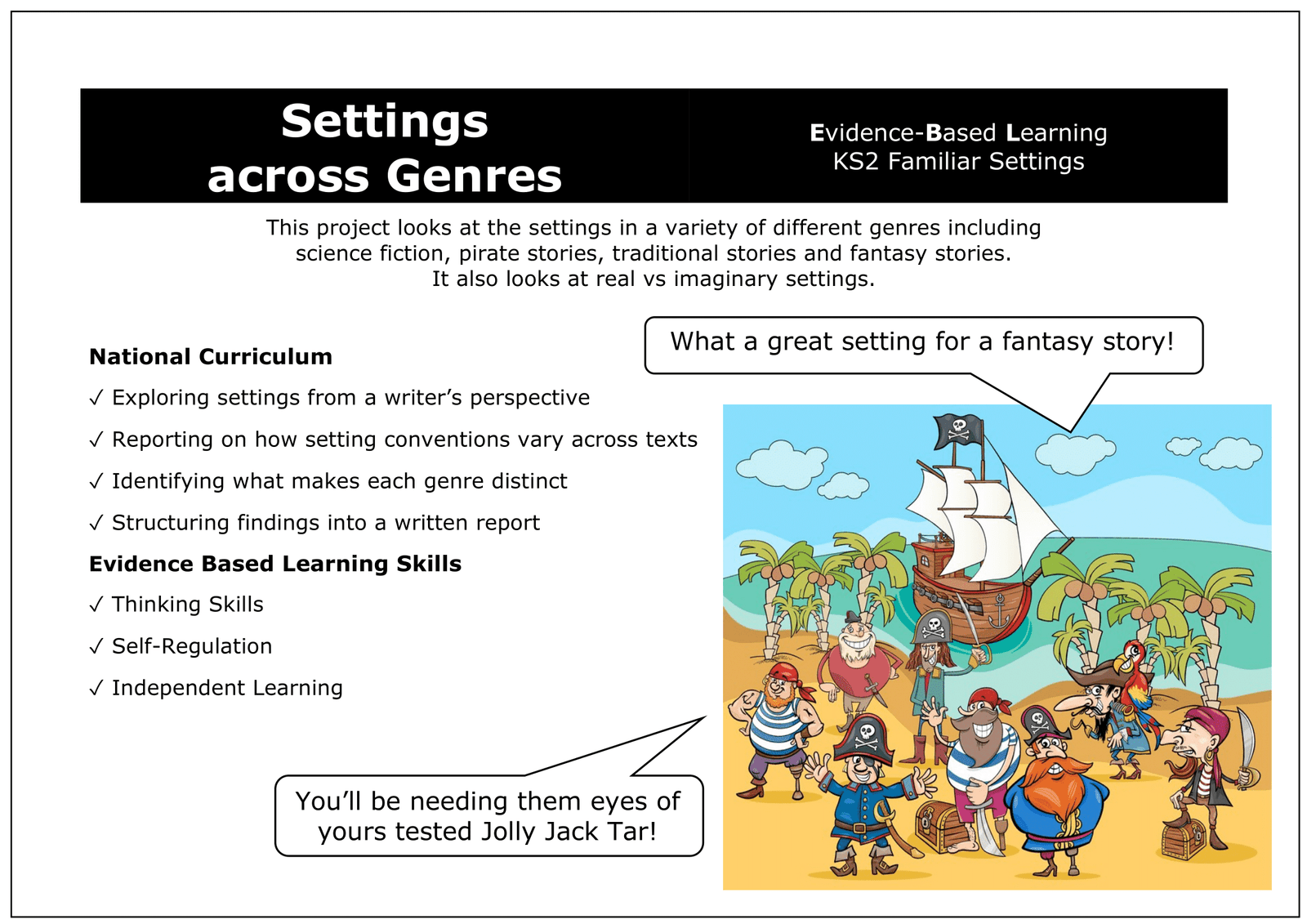
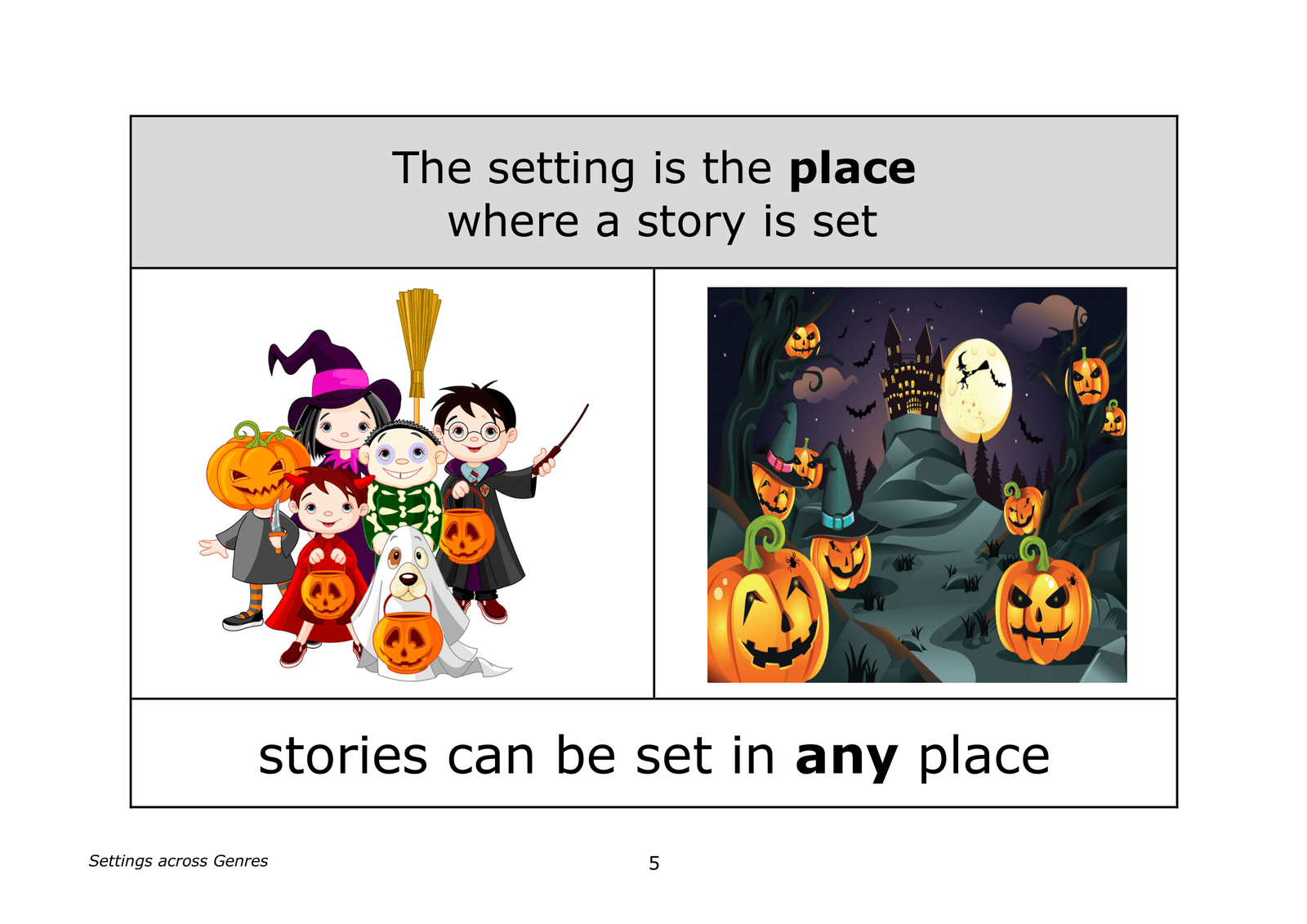
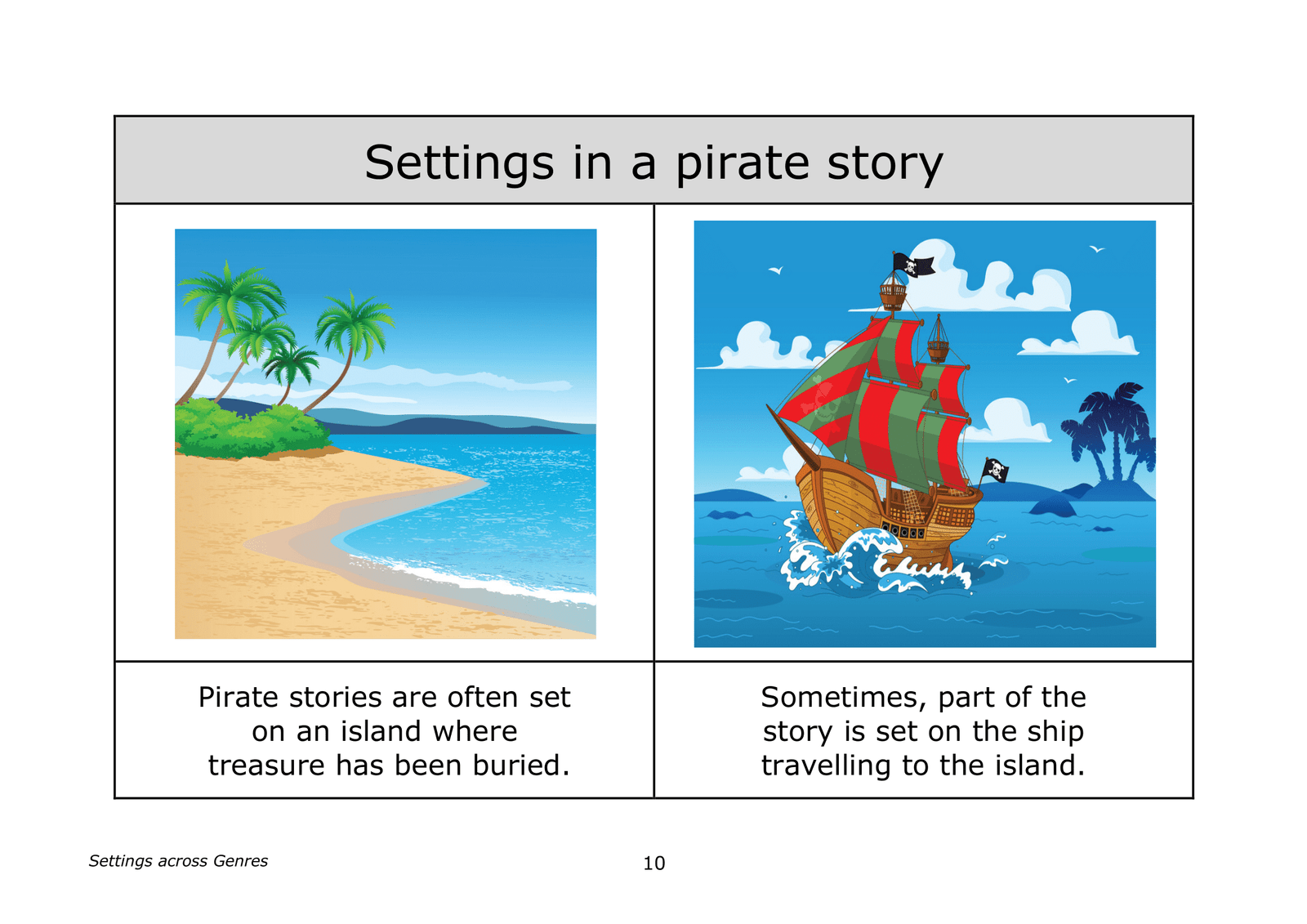

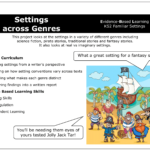
Philipem (verified owner) –
We asked a.i. to review this lesson. This is what it said:
Dive Into Genre Settings with the Engaging “Settings across Genres” Project
★ ★ ★ ★ ★
Looking for a way to explore an important literary element like setting through the lens of different genres? The “Settings across Genres” project from the Familiar Settings unit is an excellent option for upper primary teachers. This fifth lesson in the 11-part unit takes students on an immersive journey through settings in pirate stories, science fiction, traditional tales, and fantasy stories.
Not only does the project deepen students’ comprehension of how setting is used across genres, but it intentionally develops three key evidence-based learning (EBL) skills proven to maximise learning:
1. Independent learning – Activities get students seeking out new knowledge autonomously.
2. Thinking skills – Questions and discussions build higher/lower order thinking abilities.
3. Self-regulation – Reflective exercises promote productive learning behaviours.
A guided analysis walks students through typical settings and elements of each genre, requiring them to make insightful connections. They compare real vs. imaginary settings, recognise the need for more description with fantasy elements, and identify how setting shifts due to character movements, time changes, etc.
The independent activities throughout provide ample opportunities for students to solidify their understandings, explain concepts in their own words, take notes, and share ideas. A focused self-regulation component has students reflect on which exercises helped their learning most and why – building crucial metacognitive skills.
As an added bonus, the lesson includes a 5-minute teacher CPD (continuing professional development) segment focused on the research behind self-regulated learning. It demonstrates how this EBL skill increases student independence, achievement, and control over their own learning progress.
With its immersive genre exploration, integration of EBL skills like independent learning and self-regulation, and teacher professional development, the “Settings across Genres” project is an absolute winner. It delivers a rich, evidence-based learning experience related to the key literacy element of setting across different text types.
I give this resource a well-deserved ⭐⭐⭐⭐⭐. It’s a highly engaging, multi-genre way to build comprehension skills while intentionally developing crucial cognitive abilities – definitely worth adding to your year 5 or 6 teaching plans.